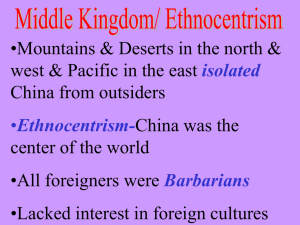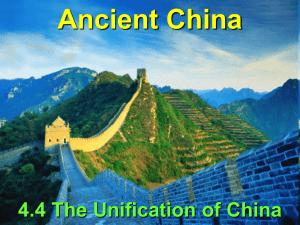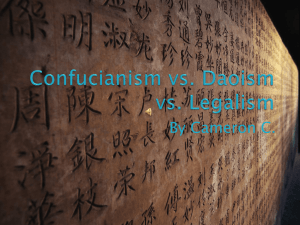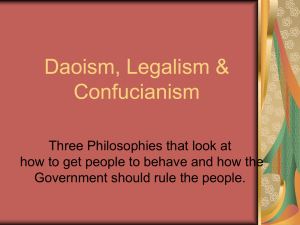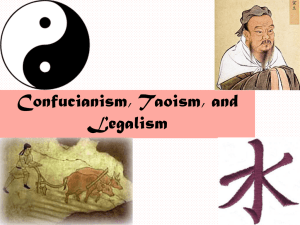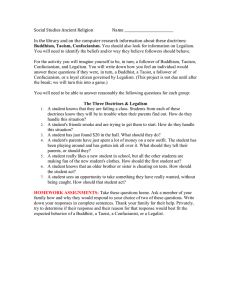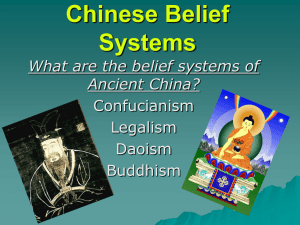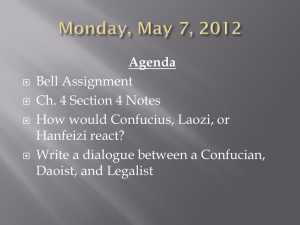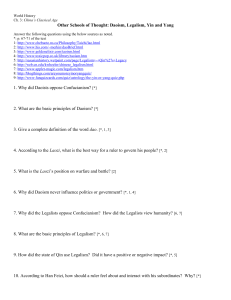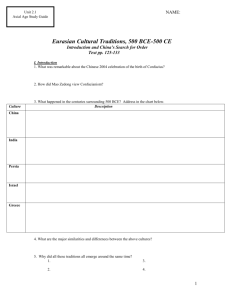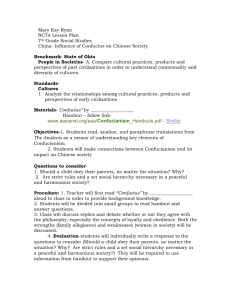File - International School of Sosua
advertisement
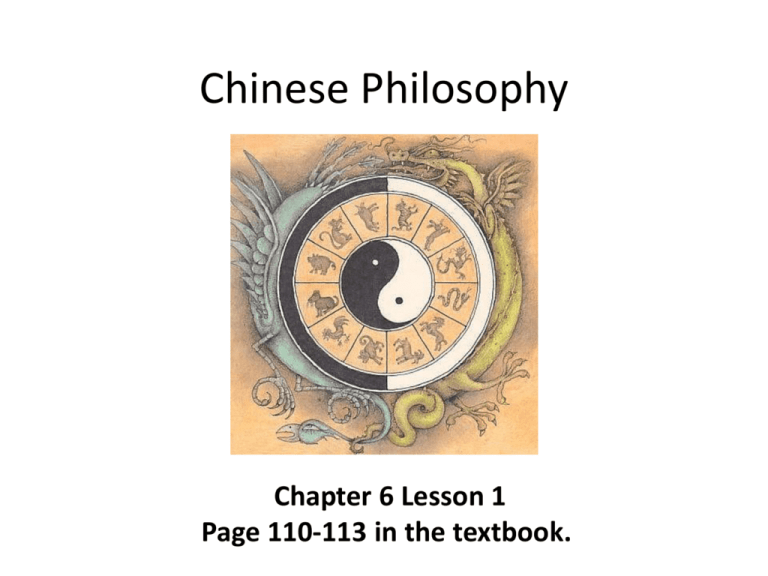
Chinese Philosophy Chapter 6 Lesson 1 Page 110-113 in the textbook. Background • Between 500 BC and 200 BC, three major schools of thought about the nature of human beings and the universe emerged in China – Confucianism, Daoism, and Legalism, • Although Hindus and Buddhists focused on freeing the human soul from the cycle of rebirth, Chinese philosophers were more concerned about the material world, and creating a stable society. Confucianism • • • • • China 500 B.C.E. Founded by Confucius (Kong Fu Tse) Spread to Japan, Korea, S.E. Asia Political-social philosophy, not religion It was compatible with other religions, could practice Buddhism and Confucianism The Analects • the Analects: the collection of sayings and ideas attributed to the Chinese philosopher Confucius. • Traditionally believed to have been written by Confucius' followers. • Main argument: the welfare of a country depended on the morals of its people, beginning from the nation's leadership. • He taught that a ruler's sense of virtue was his primary requirement for leadership. NOT birth. Quotations “If there is righteousness in the heart, there will be beauty in the character. If there is beauty in the character, there will be harmony in the home. If there is harmony in the home, there will be order in the nation. If there is order in the nation, there will be peace in the world.” Quotations “The superior man is modest in his speech, but exceeds in his actions.” “What you do not want done to yourself, do not do to others.” “If a man takes no thought about what is distant, he will find sorrow near at hand.” Importance of Relationships • Five Right relationships = right society • All relationships unequal except for the final one. 1. Parent to Child (Filial Piety), 2. Ruler to Subject, 3. Older to Younger, 4. Husband to Wife, 5. Friend to Friend. Importance of Education • Education is valuable and everyone should be able to get one. Become a gentleman. • Put aside personal ambition for good of state • His teachings emphasized self-improvement, following good example, and the development of skilled judgment rather than knowledge of rules. Daoism-Taoism • • • • • China 500 B.C.E. Founded by Lao-tzu, philosopher Dao = “The Way” (of nature) Wu wei- non-doing, harmony with nature Eternal principles, passive, yielding. Like water, yet strong, shaping. • Yin-Yang – symbol of balance in nature Yin/Yang • Believed everything in the universe had a life force- a yin and yang-opposites • Yin-dark side - moon, things that are still & death • Yang-light side - sun, things that move & birth • Must keep the yin and the yang balanced Tao Te Ching • The Tao Te Ching is widely regarded to be the most influential Taoist text. • “Life is a series of natural and spontaneous changes. Don't resist them - that only creates sorrow. Let reality be reality. Let things flow naturally forward in whatever way they like.” Beliefs • • • • Self-sufficient communities Counter to Confucian activism Emphasis on harmony w/ nature Co-existed w/Confucianism, Buddhism, Legalism Principle Teachings of the Dao • Compassion- awareness of another person’s pain and wanting to relieve it • Moderation- avoid extremes • Humility- modest, don’t brag Legalism • Founded by Han Feizi • The Qin Dynasty- Shi Huangdi • Peace & order through centralized, tightly controlled state • STRICTS LAWS and HARSH PUNISHMENTS Legalism • Mistrust of human nature; humans naturally evil • Reliance on tough laws • Punish those who break laws, reward those who follow • 2 most worthy jobs: farmer, soldier Han Feizi quotes “It is dangerous for a ruler to trust others. He who trusts others can be manipulated by others.” “ The wise ruler institutes posts, offices, ranks, and bounties in order to offer a guarantee to promote the worthy and encourage the excellent.” Significance of Legalism • Accomplished swift reunification of China. • Completion of projects like the Great Wall. • Caused widespread resentment among common people, led to wider acceptance of Confucianism-Daoism. Scenarios • How would the Confucianist, Daoist, and Legalist handle the following problems? Scenario #1 • A student knows that they are failing a class. They know they will be in trouble when their parents find out. How do they handle this situation? Scenario #2 • A student sees an opportunity to take something they have really wanted, without being caught. How should that student act? Scenario #3 • A business owner has an opportunity to open a golf course in a beautiful plot of land. Problem is, this plot of land is located on an ancient burial site. What should the business owner do?
